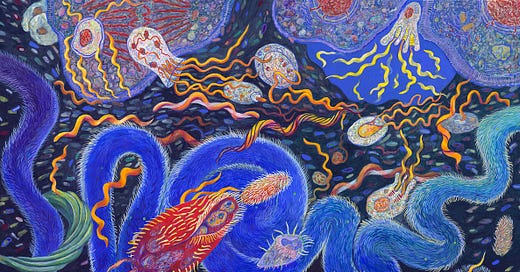The Self as Holobiont
Reflections on ecological subjectivity and freedom for the upcoming course, "Metamorphosis." Starts June 28.

“There lies the whole paradox of holobionts, or of the sociology of associations: getting more and more familiar with someone means traveling even further towards those that person is involved with… the person, the actor-network, the actant-people, the holobiont, feels himself grow wings as the items on his list, in his course of action, on his curriculum vitae, multiply; they disperse, they proliferate… he scatters, in the strict sense of the word, he shares himself, mixes, and step by step recovers powers to act that he never imagined.”
-Bruno Latour, After Lockdown: a Metamorphosis
The late Bruno Latour, in one of his last publications, explores how the holobiont, —a kind of radically relational self—brings with it an intensification of freedom. Not its diminishment.
Conversely, when we look at the ‘modern’ self, the modern ‘subject,’ we find that they experience themselves ‘pinned’ like a bug in a static subject-object relationship with their world. This kind of freedom—the freedom of standing apart from the world, looking down on it from above like the scientist looks down at their insect collection—is hardly sustainable. Standing alone and standing apart, the triumphant elation of the modern subject eventually wanes, eventually replaced by the feeling of being ‘crushed’ by the great and impersonable forces of the world. One thinks of Blaise Pascal’s feeling of terror when contemplating the “eternal silence of infinite spaces.”
Ecological subjectivity does not stand alone. The holobiont stands with. It does not face such abysses in solitude but in joyous consortiums of creatures who meet the infinite and the eternal not with cries of fear but a chorus of birdsong. To find oneself in the ecological era has something to do with finding oneself amidst the multiple.
The self is found in relation, and so too its metamorphosis.
Holobionts are multiplicities, made of multiplicities, and they draw from their relational power to bring forth new creative forms and new possibilities. New mutations. Posthumanists and ecologists like to call this “sympoiesis,” (‘making with’).
Life, as the philosopher Isabelle Stengers writes about, is always in the business of making and remaking itself. Life is always in the making, and this making is a multitude. In all times, but perhaps especially in times of catastrophie, and crisis, life is asking the quintessential Spinozan question: what is possible?
We do not yet know what ‘we’ can do, as the ecological body of the Earth, as the imbricated “I” that extends from bacterium to fungi to hominid and still more, in one great interlinked continuum that composes the living planet. If we are to respond to the present ecological crisis, we must start come to know who “we” even as one species in a greater, ecological reality. We must learn how to stop imagining ourselves as beyond this world, and get back into the picture. There we rejoin other agentic critters and kin, in the vectors of their imbricated becoming, asking that ever-present question both ancient and new: what is yet possible? What will we compose together? What might we, those of the Earth, become, in response to ecological collapse? And who is it that says “I” after the modern?
June 28 is the start of the new Mutations summer course: "Metamorphosis: Revisioning the Self After Modernity" is a five week philosophical and poetic exploration of selfhood and subjectivity in the ecological era.
How can our narratives of nature, let alone human nature, become "ecologized," recast in the vein of ecological storytelling? In a time when crises multiply and the modern worldview unravels with astonishing rapidity, we must continue to ask, perhaps now more than ever: what can we become? What possibilities are still available to us in the present? What mutations already have their hold on us, and offer a thin but true line of flight towards new life, and habitable futures?
Can the boundaries between the human and more than human become porous?
How do we start embodying modes of selfhood that have overcome that tired old "view from nowhere,” with its predictable anthropocentrism, and instead revel in participation, and radical relation?
These are the kinds of questions that can never be exhaustively answered, but we gain much from the activity of asking them. Again and again. Especially during unthinkable times like our own.
I invite you, then, dear students, to join me in living these questions for a while, as a way of beginning to live ecological futures in the present. It is only by living the future that we make it that much more imminent, and possible.
See you beginning on June 28.




I hear shades of Nora Bateson….”What is possible?”
I am intrigued.
Thank you, Jeremy.
Thank you for this beautiful piece. The timing is synchronous for me, as I was just preparing to publish a little essay that ends with the question: Who is we? This pointer towards the 'holobiont' offers new ways of describing the thing I find myself living -- or maybe, the thing that is living through me/us ...
https://incarnate.substack.com/p/the-research-cult-as-awakening-path
I appreciate all you do, Jeremy.